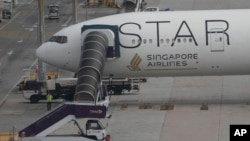A relief plane landed in Singapore early Wednesday morning carrying most of the passengers and crew who flew on a Singapore Airlines jetliner that was forced to make an emergency landing in Bangkok Tuesday after encountering violent turbulence.
A 73-year-old British man died of a suspected heart attack during the incident, with at least 71 others injured.
Singapore Airlines says Flight SQ321 was cruising over Myanmar’s Irrawaddy Basin about 10 hours into the flight from London to the city-state when it was hit by sudden severe turbulence. The Boeing 777 jetliner dropped from an altitude of about 11,300 meters to about 9,400 meters in three to five minutes before it landed in Bangkok.
Witnesses described a violent scene inside the plane during the turbulence, with passengers thrown about the cabin and slamming their heads into the overhead luggage compartments, some of them so hard it shattered the panels and caused the emergency oxygen masks to fall.
More than 140 of the 211 passengers and crew of Flight SQ321 were greeted by Singapore Airlines CEO Goh Choon Phong and their family members when they arrived at the city-state’s Changi Airport. About 79 passengers and six crew members remained in Bangkok, including 71 people who had been hospitalized.
The British national who died has been identified by the BBC and other news outlets as Geoff Kitchen, who was involved in local amateur theater. He was traveling to Singapore for a long vacation with his wife.
Goh apologized to the passengers for “the traumatic experience” they endured in a video message posted on social media and expressed his condolences to the family of the deceased.
The passenger list included several nationals from Australia, Britain, Malaysia, New Zealand and Singapore.
A 2021 study conducted by the U.S. National Transportation Safety Board found that turbulence accounted for more than a third of all accidents on commercial airlines between 2009 and 2018.
Turbulence, defined as chaotic changes in air pressure, can be caused by many factors, including unstable weather patterns that trigger storms. The most dangerous is clear air turbulence, which is difficult to detect.
Some information for this report was provided by The Associated Press, Reuters and Agence France-Presse.





